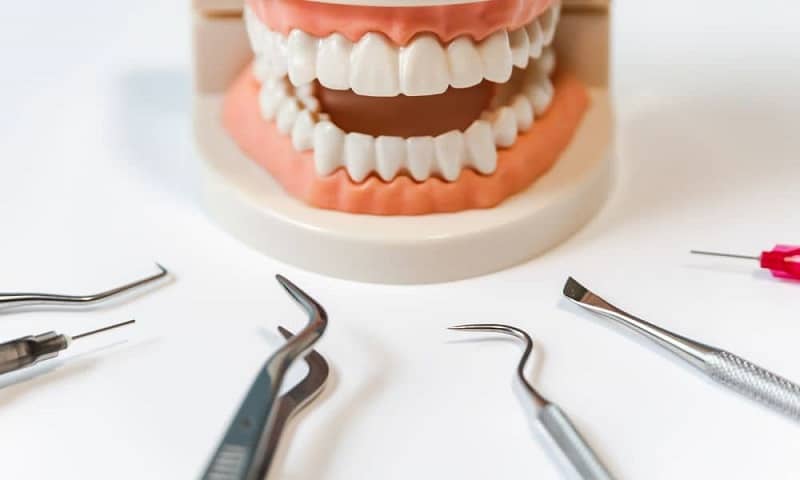
15 Jul Can You Cure Periodontal Disease at Home? | Dental Treatments
Around 75% of Americans above the age of 35 have some kind of periodontal disease.
It’s a devastating gum related disease that can also result in loss of teeth if ignored for long.
An advanced periodontal disease that pulls away tissue from teeth, Periodontitis, creates pockets and leads to bacterial build-up. And, if left untreated, periodontal disease can give rise to irreversible damage to the gums, teeth, and jaw bones.
Well, considering how common periodontal disease is, many patients want to know how can you heal it.
While good oral hygiene and regular dental check ups can prevent periodontitis, can periodontal disease be cured?
Can You Cure Periodontal Disease?
Periodontitis can be timely cured. However, it depends on the severity of the disease.
Now, if you are wondering can you cure periodontal disease at home, The answer is NO!
Though performing home remedies to cure periodontitis can provide relief for a day or 2, it certainly is not a long-term solution.
Periodontitis is a critical gum disease that needs dental treatment at every stage.
This chronic bacterial infection that affects teeth, bone, and tissue is INCURABLE!
Periodontal disease damages the bone. Hence, once it starts, it’s there to stay.
However, the good news is—you can prevent periodontal disease and manage it to an extent.
If you have a good oral hygiene routine and visit your dentist regularly, you can prevent periodontitis.
Furthermore, when questioning how do you cure periodontal disease, the only answer is periodontal treatment.
Periodontal Disease Treatment

If your dentist diagnosed you with gingivitis or periodontal disease, treatments are the only option you have.
Depending upon the condition, there are various ways to treat periodontitis.
If your periodontal issue is at an early stage, you might just need scaling. Whereas, in the case of moderate to advance level periodontitis, it requires Scaling Root Planing (SRP) and surgery.
Based on the stage and severity of the disease, some of the periodontal treatments available are:
#1. Scaling and Root Planing
SRP (Scaling and Root Planning) is the initial way through which you can cure periodontal disease.
In this two-step procedure, the dentist will remove the tartar build-up from teeth.
This includes the removal of build-up both above and below the gum lines.
After scaling, the next step includes smoothening the rough surface of tooth roots to prevent plaque and tartar build-up.
Performed by dental hygienists, it’s a kind of deep cleaning that removes calculus and brings back healthy gums.
#2. Flap Surgery
Even after deep cleaning, if the pockets and gum inflammation persists, your dentist might recommend undergoing flap surgery.
Flap surgery is a common dental treatment for periodontal disease.
The process involves lifting the gums to remove tartar build-up and then stitching the gums close to the teeth.
Moreover, flap surgery helps close the tiny gaps and prevents bacteria to create damage.
#3. Grafting
This comes under advanced level periodontal treatment. Gum grafting is mainly performed on receding gums.
The process includes extracting small pieces of tissue from the top of the mouth and planting it in the exposed spaces. The grafting technique allows tissues to re-grow and expand.
This process of Guided Tissue Regeneration (GTR) replaces the infected tissue and prevents further bone loss.
Moreover, grafting is done to repair both damaged bone and tooth gums.
The success of the periodontal treatments depends on:
- how deep your disease was
- how well the patient continues to take care of their oral hygiene after treatment
Moreover, only knowing how can you cure periodontitis is not enough.
To prevent recurrence of periodontal disease, one needs to adopt an effective oral hygiene procedure.
The preventative dental care steps include:
- getting rid of smoking habits
- avoiding alcohol
- limiting sugar intake
- proper brushing and tongue cleaning
Clearly, the best defense against periodontitis is taking great care of your teeth and getting dental check-ups regularly.
So, if you’re wondering how to cure gum disease without a dentist, you can’t really achieve that.
But desperate times call for desperate measures.
That is to say, while we were in the middle of the pandemic, dental treatments weren’t actually possible. Canceled appointments and complete lockdown added to the trouble.
Also, if you’re traveling to an unfamiliar place where you aren’t aware of any dentist, keeping a check on periodontal disease and controlling it becomes both crucial and difficult.
So, how can you heal periodontitis until you meet the dentist?
How to Control Periodontal Disease Until You See a Dentist? – 5 Remedies

When you have periodontitis, dentists seem to be the last resort.
However, it’s not always possible to keep up with the appointments.
Hence, in a time of crisis, you can follow certain measures to control the bacteria to multiply and make any aggressive progress.
So, what can you do?
#1. Toothpaste
You can use fluoride toothpaste and stop the disease from progressing. It’s of great help if your periodontitis is at an early stage.
Using the right toothpaste can detoxify and neutralize the bacterial build-up from forming into plaque.
How to do it: Put a thin layer of fluoride toothpaste on your brush and thoroughly brush all your teeth with it. Make sure to brush it where teeth meet the gums. Next, leave it on your teeth for 5 minutes before you rinse it.
#2. Mouthwash W/ Chlorhexidine Gluconate
Mouthwashes can help for those searching how can you cure periodontal disease at home.
Not only it is easy to do but it is also equally effective if you use the right mouthwash.
Chlorhexidine gluconate is one of the widely recommended mouthwashes by dentists for periodontitis and gum disease.
It’s a germicidal mouthwash known to reduce bacterial build-up. It can even prevent cavities, reduce plaque, and treat periodontitis.
How to do it: You can use it twice a day according to the usual prescriptions dentists give. This will help provide 24-hour protection to your teeth from gingivitis (early gum disease) and also improve bad breath.
#3. Antioxidant Gel
Antioxidant gels are also used as a treatment for periodontitis by many dentists.
Antioxidant gels with Doxycycline are commonly used to kill bacteria. It also seals the pockets that occurred due to periodontal disease.
Notably, in case you’ve already gone through periodontal treatment but couldn’t keep up with the appointments, you can use Doxycycline gel till you see your dentist.
Also, it is often recommended by dentists after undergoing scaling and root planing.
#4. Oral Hygiene
Lastly, nothing can replace a good dental care routine.
Your oral hygiene routine must include:
- Brushing your teeth 2 times (day and night)
- Tongue cleaning
- Flossing or using an interdental brush
- Using mouth wash
Apart from this, if you already have periodontitis disease, put in some extra effort and clean your mouth with plenty of water after eating anything.
#5. Keep Your Lifestyle in Check
If your dentist is currently unreachable, you can prevent periodontal disease from getting worse by making changes in your lifestyle.
Here’s what you can do:
- Replace the brush every 3-4 months
- If you have crooked teeth, you must use an interdental brush for deep cleaning
- Rinse the brush nicely before using it
- Carry a mouthwash in case you frequently dine out
- Make it a habit to use a tongue cleaner
- Cut down on soda consumption
By taking these steps, you can take control of your periodontal condition until your dentist is available.
Remember that these oral remedies are just to mitigate or postpone the damage until you can get a dental consultation.
The sad news is in spite of the urgency of this oral condition, many people are petrified of dental treatments.
But what if you leave periodontal disease untreated?
What Happens If You Don’t Treat Periodontal Disease?
A healthy mouth carries a manageable level of bacteria. However, when the build-up exceeds, it can cause immense damage.
Also, factors like poor oral hygiene and eating habits can give the bacteria an upper hand.
When left unattended, periodontitis can have many adverse effects.
Notably, contrary to the common notion, gum disease progressed to periodontitis can affect overall health.
Some of the risks of not treating periodontitis include:
1: Heart issues
2: Digestion problems
3: Diabetes
4: Respiratory issues
Here’s how things go down when you have periodontal disease.
#1. Heart Attack and Stroke
The appearance of gum pockets due to periodontitis allows a way for bacteria to enter the bloodstream.
It then forms into plaque and blood clotting. This, as a result, affects the smooth blood flow and results in heart attacks.
#2. Poor Digestion
If you’ve periodontal disease and poor digestion, there are chances both are linked. Bacteria leading to gum disease have an unrestricted path to the digestive tract.
These bacteria, when reaches your digestive tract, lead to many gastrointestinal issues including inflammation and poor digestion.
#3. Diabetes
People who keep ignoring periodontal disease are at a higher risk of developing diabetes.
Not to mention, blood sugar levels become even more difficult to manage after the progression of the disease.
It is because bacteria reaching the bloodstream spikes the blood sugar level.
#4. Respiratory Issues
Although people don’t believe it at first, ignoring periodontal disease can affect your respiration as well.
Untreated periodontitis alerts the body and creates inflammation. This makes things difficult for those with asthma and Chronic Obstructive Pulmonary Disease (COPD).
For those who couldn’t believe how can a gum related disease make you sick, well, now you know how.
The Takeaway
Developing periodontitis, plaque, and tartar are common. However, what’s not common and advisable is leaving it untreated.
It is a fact that most people don’t look after their dental care.
People often try to get rid of oral issues at home through brushing and flossing. But that’s clearly not enough for periodontal disease.
In case you have dental and oral problems, it becomes essential to pay a visit to your dentist.
Advanced gum diseases like periodontitis are incurable but certainly manageable if detected early.
It’s the only way you can cure periodontal disease and prevent its progression.
So, if you really want to keep relishing your favorite dishes, it’s better to not ignore a deteriorating dental condition.
If you know someone with poor oral health, make them read this blog. Also, if this blog motivated you to visit your dentist, leave a heart below.



No Comments